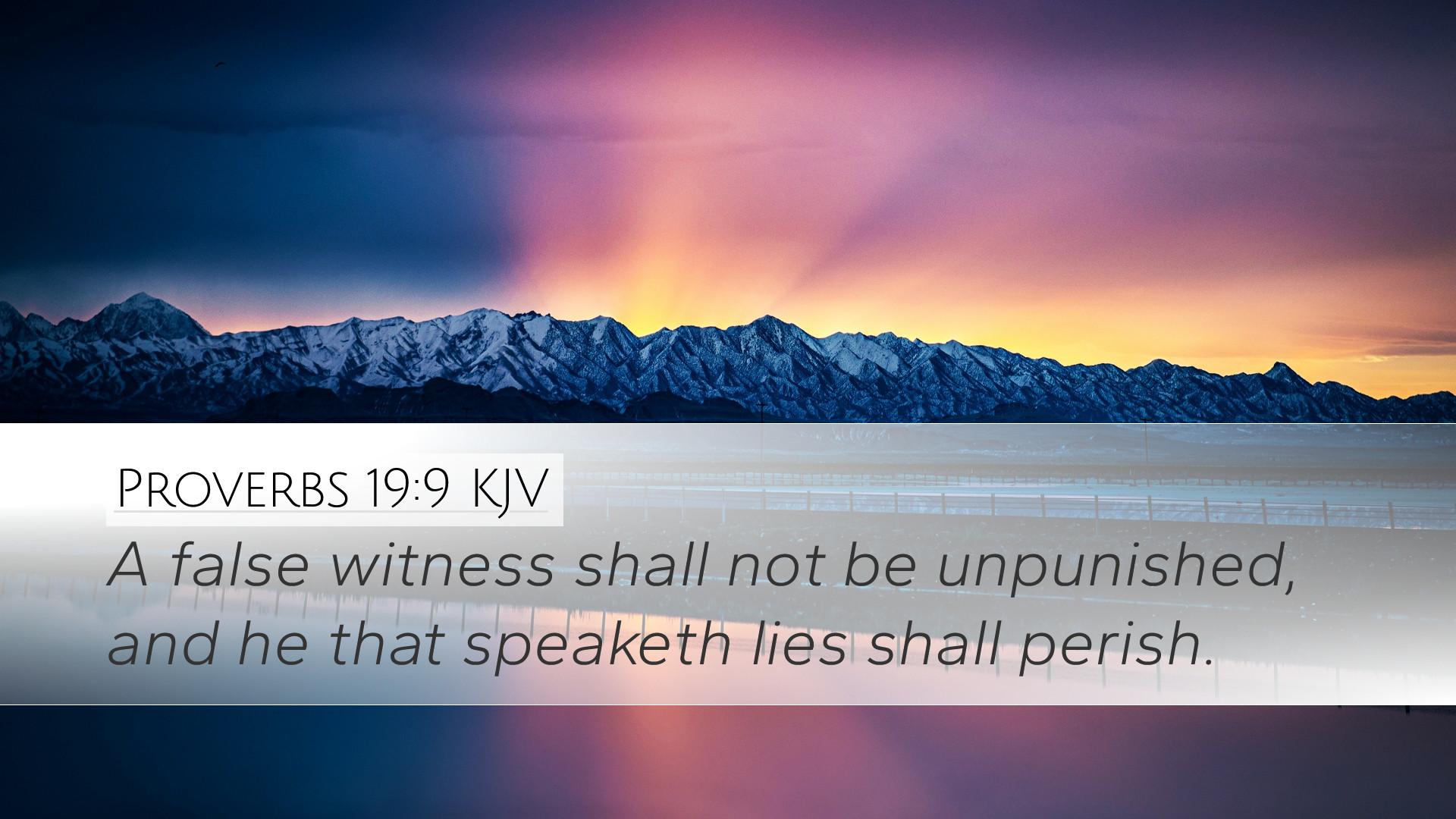Commentary on Proverbs 19:9
Verse: "A false witness shall not be unpunished, and he that speaketh lies shall perish."
Introduction
The book of Proverbs is replete with wisdom concerning the nature of truth, honesty, and justice. Proverbs 19:9 serves as a significant reminder of the moral weight of our words, especially in the context of justice and societal integrity. The verse emphasizes the severe consequences that accompany falsehoods and deceit, an important principle for pastors, students, theologians, and Bible scholars alike.
Insights from Matthew Henry
Henry states that the moral law is essential for a well-ordered society, and this particular proverb reiterates that dishonesty has far-reaching consequences. The phrase “A false witness shall not be unpunished” strongly suggests divine justice at work; those who perjure themselves will face repercussions, either in this life or the next. Moreover, Henry highlights the broader implications of personal integrity; a society built on truth will thrive, while one built on lies will ultimately decay.
- Divine Justice: False witnesses will experience punishment, affirming the importance of truth in legal matters.
- Consequences of Lies: The deceptive individuals will ultimately face ruin.
Insights from Albert Barnes
Barnes emphasizes that the verse reflects the grave danger of false testimony, particularly in judicial settings. He notes that the strength of societal structures depends on the veracity of its members. A false witness disrupts justice, leading to societal chaos:
- The Weight of Words: Every word spoken carries a weight, and falsehoods can lead to catastrophic consequences.
- Community Impact: Dishonesty affects not just the individual, but the community’s moral fabric.
Insights from Adam Clarke
Clarke builds upon the theme established by Henry and Barnes, focusing on the personal spiritual implications of deceit. He remarks on the futility of lies: “he that speaketh lies shall perish”, indicating that lies have a way of corroding the soul and leading to ultimate destruction. Moreover, Clarke reflects on the importance of ensuring that one’s words align with God’s truth:
- Spiritual Decay: Emphasizes that lies lead to spiritual ruin.
- Call for Integrity: There is an implicit call for believers to uphold truth as a reflection of God’s nature.
Theological Implications
From a theological perspective, Proverbs 19:9 serves as a warning about the nature of sin and its consequences. The notion that “he that speaketh lies shall perish” can be interpreted through the lens of the Fall, where deceit took root and led humanity away from God. The verse encourages believers to pursue truth actively, mirroring the character of God, who is described as the ultimate standard of truth.
Practical Applications
In light of this verse, various practical applications can be made for both individuals and communities:
- Integrity in Speech: Believers should strive for honesty and transparency in all communications.
- Avoiding Gossip: The church community must guard against misleading information that could harm reputations or relationships.
- Justice in Action: Encouragement for all to advocate for truth in legal and personal matters reflects the character of God’s justice.
Conclusion
Proverbs 19:9 embodies a timeless principle that remains critically relevant in today’s society. With commentary from respected theologians such as Matthew Henry, Albert Barnes, and Adam Clarke, we gain a comprehensive understanding of the necessity for truthfulness. The commitment to upholding truth will foster a healthy community and align with God’s desires for justice and integrity. As pastors, students, theologians, and scholars reflect on this verse, may they deeply understand the profound impact of words and the unequivocal stance that Scripture takes against deceit.


